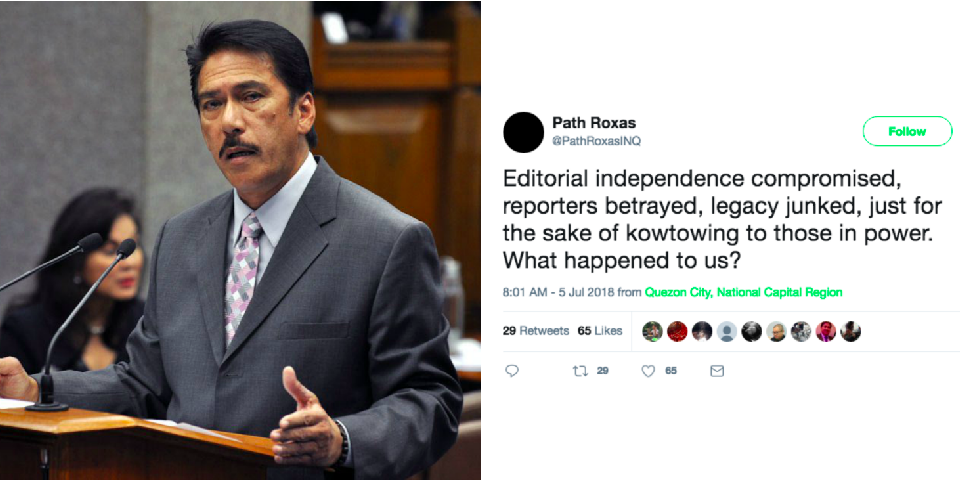Many Filipinos have been outraged since The Philippine Daily Inquirer’s website removed three articles related to the controversial Pepsi Paloma rape case earlier this week, after a request from Philippine Senator Tito Sotto.
But apart from casual netizens, the backlash has also come from some reporters who work at Inquirer.
Some reporters have changed their Twitter display photos to a plain black background, presumably to mourn the “dark day in journalism,” as the National Union of Journalists of the Philippines put it.
Inquirer reporter Vince Nonato tweeted on the night the articles were taken down: “If we allow ourselves to be kicked around, what is our use then?” He also added a verse from Spolarium, a song by local band Eraserheads, which is said to be about the rape case.
Paloma was a Filipino actress who was allegedly raped by Sotto, his brother Vic, and friends Joey de Leon and the late Richie D’Horsey in 1982. All four men are known comedians in the Philippines.
Three years after the alleged rape, Paloma died in an apparent suicide.
Nonato said: “It says so in the song: ‘We still don’t know why we’re here.'”
https://twitter.com/VinceNonatoINQ/status/1014493918606471168
The following morning, Nonato wrote: “If you survive by kissing ass, is survival worth it?”
https://twitter.com/VinceNonatoINQ/status/1014661796462903296
Nonato seemed to be firm in his stance of keeping the articles on the Internet.
In another tweet, he shared the archived versions of the stories that have been taken down due to the “say-so of a sitting senator.”
He added in a mix of Filipino and English: “Will Wayback Machine take these down too? To be continued.”
https://twitter.com/VinceNonatoINQ/status/1014493370981289984
Path Roxas, another reporter from Inquirer, shared her own thoughts on editorial independence.
“Editorial independence compromised, reporters betrayed, legacy junked, just for the sake of kowtowing to those in power. What happened to us?” Roxas asked.
Editorial independence compromised, reporters betrayed, legacy junked, just for the sake of kowtowing to those in power. What happened to us?
— Path Roxas (@PathRoxasINQ) July 5, 2018
Inquirer reporter Krixia Subingsubing added to the conversation: “If the broken links do indeed prove that the articles have been taken down as per SP Sotto’s request, then this sets a dangerous precedent for editorial independence.”
“Anyone wishing to have unfavorable articles of themselves taken down could easily use this as an example,” Subingbing added.
If the broken links do indeed prove that the articles have been taken down as per SP Sotto’s request, then this sets a dangerous precedent for editorial independence. Anyone wishing to have unfavorable articles of themselves taken down could easily use this as an example. https://t.co/DKhlKfcLqo
— Krixia Subingsubing (@krixiasINQ) July 4, 2018
Nash Tsymans, a contributing writer for the publication, called the news outlet out on Twitter, asking if she should take the incident as a warning.
“Dear @inquirerdotnet, as someone who contributes opinions to your paper, should I take this as a precedent? That if I issue an opinion against a powerful person who complains against what I write, you will side with power and throw me under the bus? Just asking.”
Dear @inquirerdotnet, as someone who contributes opinions to your paper, should I take this as a precedent? That if I issue an opinion against a powerful person who complains against what I write, you will side with power and throw me under the bus? Just asking. https://t.co/DWMIiW2D2g
— Nash Tysmans (@nashtysmans) July 5, 2018
Jhesset Enano wrote that she, along with fellow writers, “will not take this sitting down.”
“It is nothing less than a disgraceful act that sets a dangerous precedent in a time when a free press is most needed,” Enano’s tweet stated.
If some think that kowtowing to those in power will restrain us from telling and standing for the truth, they are mistaken. We will not take this sitting down. It is nothing less than a disgraceful act that sets a dangerous precedent in a time when a free press is most needed.
— Jhesset O. Enano (@JhessetEnano) July 4, 2018
However difficult these times are, Inquirer reporter Jovic Yee said that they will continue to serve the public with the truth.
“They may have cowered to the powers-that-be at a time when this country needed the most a fair, strong and independent press,” wrote Yee. “But we will remain steadfast despite the challenges, for our first obligation is to the truth.”
They may have cowered to the powers-that-be at a time when this country needed the most a fair, strong and independent press. But we will remain steadfast despite the challenges, for our first obligation is to the truth. https://t.co/jFHwYkyyV7
— jovic yee (@jovicyee) July 4, 2018
CNN Philippines writer Regine Cabato commended the Inquirer writers for having the courage to speak out.
“People have been hitting the Inquirer, but has anyone else noticed its reporters have been tweeting against the takedown?” Cabato asked. “Takes courage to stand up to government officials (a given in this job), but more courage to stand up to your bosses,” she ended.
People have been hitting the Inquirer, but has anyone else noticed its reporters have been tweeting against the takedown? Takes courage to stand up to government officials (a given in this job), but more courage to stand up to your bosses. https://t.co/YPuYaQoa2m
— Regine Cabato (@RegineCabato) July 5, 2018
Inquirer released a statement yesterday addressing the issue stating that they are “adhering to journalism’s core values of accuracy, fairness, balance, integrity, and responsibility.”
“Any doubt or question on the veracity of its articles are taken seriously and dealt with properly in accordance with our values and principles. We do this on all stories, features, and opinion pieces,” wrote Inquirer.net Editor in Chief Abelardo S. Ulanday.
“We believe this is not a question of press freedom but the veracity of a story.”




